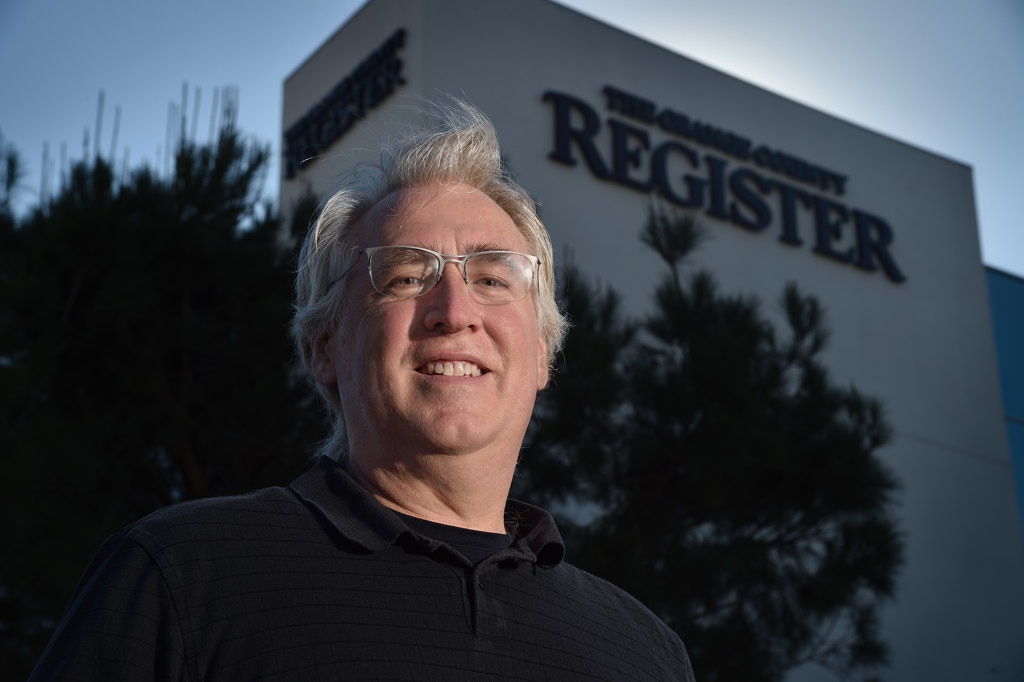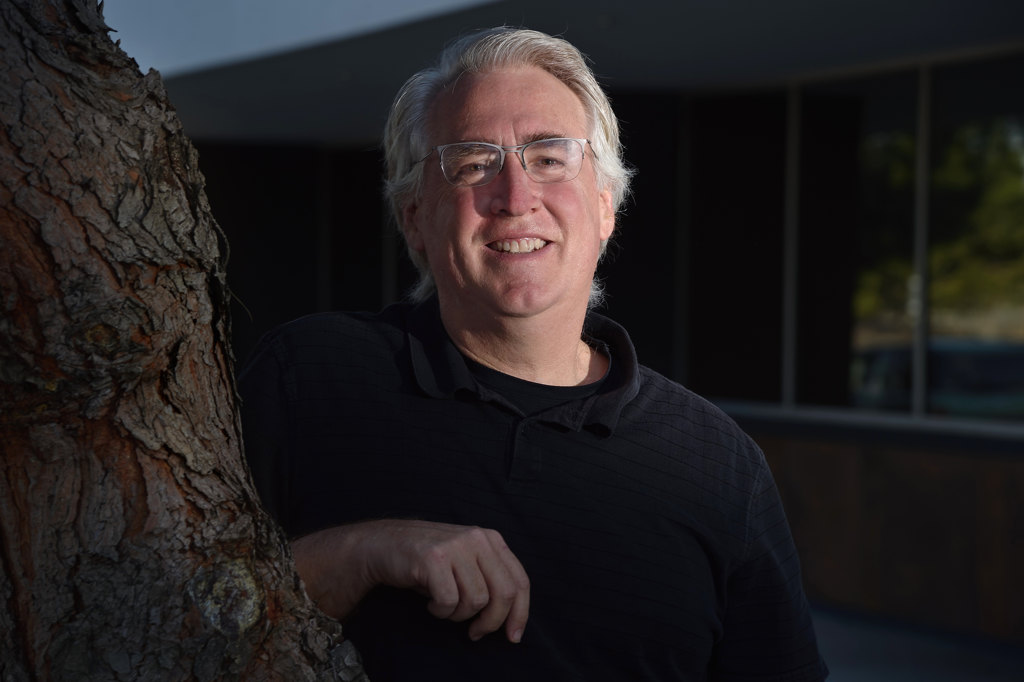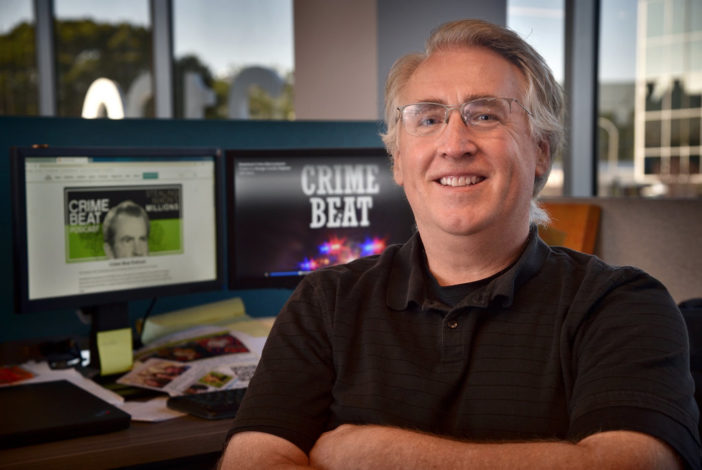Keith Sharon has a story to tell.
That’s no surprise, since he’s been telling stories for nearly four decades as a journalist, screenwriter, and, now, podcaster.
The veteran Orange County Register reporter’s “Crime Beat” podcast, produced by Sharon’s employer, Southern California News Group, debuted Feb. 7.
The podcast, which recounts the biggest bank heist in U.S. history, in 1972 in Laguna Niguel, is approaching 5,000 downloads with listeners in 20 countries.
Episode three of the 30-minute podcast, “Stealing Nixon’s Millions,” is available tomorrow, Valentine’s Day, with the remaining three coming out on the following consecutive Thursdays.
The podcast is based on a 10-part series Sharon wrote for the Register in 2002. It also is the subject of a movie, “Finding Steve McQueen,” which hits the big screen and streaming services March 15.
Sharon wrote the original screenplay for “Finding Steve McQueen,” whose release date, coincidentally, comes 17 years to the day after the movie based on Sharon’s first screenplay, the Robert DeNiro-Eddie Murphy cop buddy movie spoof “Showtime,” came out.
For Sharon, almost any question about the “Crime Beat” podcast – or pretty much anything – unspools into a story behind the story.
“Remind me to tell you about the time I saw (a preview of “Finding Steve McQueen”),” Sharon said over lunch on Friday, Feb. 8, at The Catch in Anaheim.
“It’s a good story.”
Of course it is (more on that later).
LET’S DO LUNCH
Sharon always has been a “let’s do lunch” guy when discussing his craft or conducting interviews for the Orange County Register, where he’s worked at since 1985 (although he left the newspaper four times).
As an OCR journalist, he’s tackled everything from sports, education, cities, investigations, and general assignment stories.
He began his journalism career in 1981 covering high school football for the Cerritos Community Advocate.
Now, he hobnobs at times with Hollywood-types as a screenwriter with two movie credits.
In the “Crime Beat” podcasts, Sharon has discovered a new way to tell his engaging narratives. The bank heist podcast is a layered and often-humorous tale that is rare for a genre known for corpses, gore, and gloom and doom.
“The heist itself is cool, but what happened afterward with the characters is even more cool,” Sharon says.
There actually are three different narratives going on in “Stealing Nixon’s Millions.”

Keith Sharon’s next “Crime Beat” podcast will be grittier. It will recount the 1994 slaying of Cal State Fullerton student Cathy Torres, whose body was found in the trunk of her car in Placentia. Photo by Steven Georges/Behind the Badge
There’s the tale of the heist itself, which was carried out by a gang of close-knit thieves from Youngstown, Ohio, after they learned that President Richard Nixon may have stashed $30 million in illegal contributions and blackmail money at a bank at Crown Valley Parkway and Coast Highway (the bank no longer exists).
Then there’s the narrative about Sharon and how he wrote the OCR bank heist series in the Register 17 years ago, and the long journey that series took to the big screen as an independent movie with a $7-million budget. “Finding Steve McQueen,” directed by Mark Steven Johnson, stars Travis Fimmel, William Fichtner, Rachael Taylor, and Forest Whitaker. Ken Hixon wrote the final script.
And the third narrative has Sharon stepping out of his narrator role, talking about the bank heist and the reporting behind it (as well as the new movie) and interjecting such ear candy as the Top 10 best bank heist movies ever made (in Sharon’s opinion), and explaining the difference between a robber (street thug) and a burglar (a more sophisticated criminal.)
“I knew that part of the (bank heist) story was how a newspaper article becomes a movie,” Sharon said. “So the whole heist, the getaway, and all the arrests are episode one through five, and episode six is the Hollywood stuff – the ‘you’ll never believe what happened’ about the movie getting written, the movie deal falling apart, and personal drama.”
Ultimately, the podcast “Stealing Nixon’s Millions” is the latest example of solid narrative-style journalism a la “Dirty John,” the hugely popular podcast from Christopher Goffard of the Los Angeles Times. “Stealing Nixon’s Millions” is painstakingly reported and written with cliffhangers at the end of each episode (example: “It was the perfect crime – or so they thought.”)
Says Sharon: “We’re doing journalism here. We’re going out and telling stories. This is what we do.”
Sharon’s next “Crime Beat” podcast will be grittier. It will recount the 1994 slaying of Cal State Fullerton student Cathy Torres, whose body was found in the trunk of her car in Placentia.
The 20-year-old’s murder was the focus of the recent debut episode of the TV crime show “The Price of Duty,” featuring Sgt. Daron Wyatt of the Anaheim PD.
Sharon, a lifelong fan of true crime tales, has written the first seven episodes of the Cathy Torres podcast.

Keith Sharon recorded the “Crime Beat” podcast in a walk-in closet at his home in Trabuco Canyon.
Photo by Steven Georges/Behind the Badge
He stumbled onto the genre two years ago after getting an iPhone for Christmas. He clicked on the “Podcasts” icon, and the most popular one at the time happened to be a cold-case murder series produced by the Cincinnati Enquirer and edited by Amy Wilson, a former colleague of Sharon’s at the Orange County Register.
Sharon was dumfounded, and knew he had a great idea for his own podcast: the intricate tale of Harry Barber and his pals, who used 16 sticks of dynamite to break into the vault in the San Clemente bank. Barber, the getaway driver, was obsessed with Steve McQueen growing up.
Sharon recorded the podcast in a walk-in closet at his home in Trabuco Canyon.
“I set the computer on top of the hamper for dirty clothes, and placed the microphone in a sock drawer,” says Sharon, who is married with three children. “I sat on a chair, closed the door, and just did it.”
Oh, and about Sharon’s story about seeing a test screening of “Finding Steve McQueen.”
After countless rewrites and after Hixon was hired to retool Sharon’s original script, the movie’s producer, with whom Sharon had kept in touch, invited him to a test screening of the movie.
Sharon had to pretend he was someone else while getting interviewed by screening staff at the high-security event in Pasadena last year. After all, it’s not common for a movie’s original screenwriter to be invited to a test screening and provide feedback. And Sharon had to run a couple miles to leave his cell phone in his car since all recording devices were banned.
“I’m proud if it,” he said of “Finding Steve McQueen,” which is based on the actual bank heist but contains many fictional elements.
Sharon said the “Stealing Nixon’s Millions” podcast, most of which was completed last year, was important to finally getting “Finding Steve McQueen” made and released. And now, he’s become somewhat of an authority on podcasts in the journalism world.
“What we’re learning is the key to this podcast game is you have to raise your number of downloads,” Sharon said. “Downloads are not listens. It’s different. You have to get people to subscribe. Once you subscribe, we get credit.”
To listen to the “Stealing Nixon’s Millions” podcast, click on these links:
 Behind the Badge
Behind the Badge



